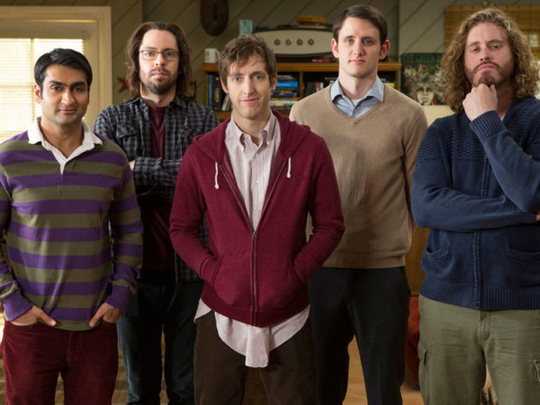
Mike Judge is nothing if not consistent.
His films Office Space and Idiocracy and his cartoon series King of the Hill all betray an affection for small lives distorted by moneyed interests; a disdain for institutional double-speak; a distrust of structure; and a bemusement over a world where the higher you go up the ladder the weirder things get. The titular heroes of his breakthrough Beavis & Butt-head may have been idiots themselves, but they were idiots in the service of taking down the (momentarily) powerful and poking holes in MTV, the network where they lived.
Silicon Valley, which Judge created with King of the Hill writing partners John Altschuler and Dave Krinsky, is his first live-action series. It airs in the UAE on Mondays, and in its deceptively modest way, it is a great one. In the marketplace, Judge’s work tends to start slow and gather a cult.
Concerning a pack of young software writers suddenly making a noise in the new tech gold fields in and around Palo Alto, it is in some respects a sequel to Office Space, which set the style — naturalism shading into the surreal — for a generation of cubicle comedies. It also shares its milieu with the more romantic Amazon series Betas, though not its attitude, which is typically dry and sceptical.
Judge, who has a degree in physics and has worked as a programmer, lived briefly himself in Silicon Valley in the late 1980s. But he quit the startup he moved there to join to be the bass player in a blues band, which tells you, really, everything you need to know. Music led him to Texas, where he studied some more maths and, in a kind of Road to Damascus moment, got interested in animation, which led him to King of the Hill.
Thomas Middleditch plays Richard, who lives with fellow coders Gilfoyle (Martin Starr), Dinesh (Kumail Nanjiani) and Big Head (Josh Brener) in a house overseen by Erlich (T J Miller), a former hacker exchanging room and board for a piece of whatever apps his tenants create. An ingenious algorithm at the heart of Richard’s otherwise weak idea (an application that allows songwriters to discover whether they’re violating a copyright) makes him the centre of a bidding war of sorts, between Gavin Belson (Matt Ross), the head of the Googlesque company on whose campus he works, and on-the-spectrum venture capitalist Peter Gregory (Christopher Evan Welch, who died of lung cancer at the age of 48 while the season was still in production).
“It’s weird,” says Belson, looking down on his campus. “They always travel in groups of five, these programmers. There’s always a tall skinny white guy, short skinny Asian guy, fat guy with a ponytail, some guy with crazy facial hair and then an east Indian guy. It’s like they trade guys until they all have the right group.”
Although it does not exactly describe the show’s core group, it does comment on the show’s lack of women; Amanda Crew, as Gregory’s right hand and liaison to the real world, alone cracks the main cast. The only other halfway significant female roles in the five episodes I’ve seen go to a stripper and a couple of paid party guests.
That it is in fact the case that, for a variety of bad reasons, women are underrepresented in this world does not mean that they could not be realistically included here. But it is also true that, notwithstanding a great creation like King’s Peggy, Judge is most interested in stories about men, or, more to the point, about guys, and how they get on.
It is in its way a western, a New West western, a story of men not quite without women, but not really with them — not comfortable with them, anyway. Their approach to sex, and to the opposite sex, commingles fear and respect in a way that’s almost refreshing.
“I didn’t even shake a woman’s hand until I was 17 years old,” Dinesh says when Erlich brings the above-mentioned stripper into the house. “The idea of getting an erection around men I live and work with is just not something I can handle.”
At times, it has the structure of an old army film, with Erlich as sergeant, albeit one who takes his own unreliable directions from psychotropic drugs. It is also a little bit of a Frank Capra movie, with Richard the innocent, trying to stay whole in a sea of sharks that introduce themselves as dolphins — Judge makes cant about “making the world a better place” into a running joke — and Crew’s character as the proximate tough-warm Jean Arthur figure. (There is no hint of romance, though, as far as I’ve seen.)
These sturdy structural models give the show a grounding in which the shifting relations among characters — money changes everything — profitably flourish. The cast members — mention should be made of Zach Woods as a business advisor — have presence but do not push the jokes. Silicon Valley is a comedy, certainly, and a very funny one, but it doesn’t spend all its time reminding you of the fact.












